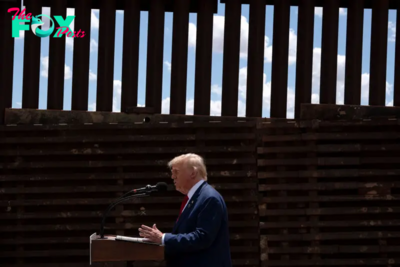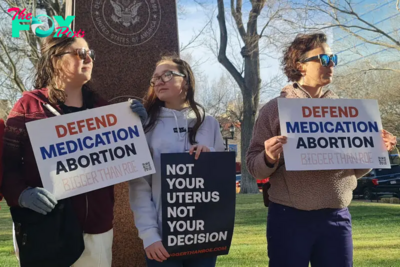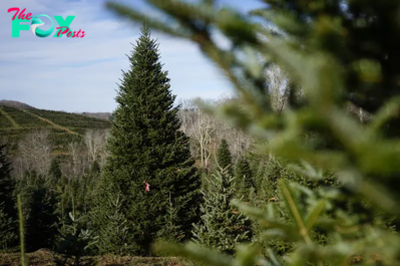Politics
Why rural white Americans’ resentment is a threat to democracy
Rural white voters have long enjoyed outsize power in American politics. They have inflated voting power in the U.S. Senate, the U.S. House and the Electoral College.
Although there is no uniform definition of “rural,” and even federal agencies cannot agree on a single standard, roughly 20% of Americans live in rural communities, according to the Census Bureau’s definition. And three-quarters of them – or approximately 15% of the U.S. population – are white.
Since the rise of Jacksonian democracy and the expansion of the vote to all white men in the late 1820s, however, the support of rural white people has been vital to the governing power of almost every major party coalition. Which is why my co-author Paul Waldman and I describe rural white people as America’s “essential minority” in our book “White Rural Rage: The Threat to American Democracy.”
As a political scientist, I’ve written or co-written five books addressing issues of racial politics at some level of government or part of the country. My latest, “White Rural Rage,” seeks to understand the complex intersections of race, place and opinion and the implications they hold for our political system.
The unfortunate fact is that polls suggest many rural white people’s commitment to the American political system is eroding. Even when they are not members of militant organizations, rural white people, as a group, now pose four interconnected threats to the fate of the United States’ pluralist, constitutional democracy.
Although these do not apply to all rural white people, nor exclusively to them in general, when compared with other Americans, rural white people:
- Express the most racist, least inclusive, most xenophobic, most anti-LGBTQ+ and most anti-immigrant sentiments.
- Subscribe at the highest rates to conspiracy theories about QAnon, the 2020 presidential election, Barack Obama’s citizenship and COVID-19 vaccines.
- Support a variety of antidemocratic and unconstitutional positions and exhibit strong attachments to white nationalist and white Christian nationalist movements inimical to secular, constitutional governance.
- Are most likely to justify, if not call for, force or violence as acceptable alternatives to deliberative, peaceful democracy.
Let’s examine a few data points.
Xenophobia
In a Pew Research Center poll conducted in 2018, 46% of white rural Americans said it is important to live in a diverse community. That’s a lower proportion than urban and suburban dwellers and even nonwhite rural residents.
And in rural areas, fewer than half the people said white people have advantages Black people do not, approve of the legalization of same-sex marriage, and say immigrants make American society stronger.
In addition, Cornell researchers found that rural whites reported feeling less comfortable with gay and lesbian people than urban whites do. And 49% of rural LGBTQ+ people between the ages of 10 and 24 called their own towns “unaccepting” of LGBTQ+ people – nearly twice the rate of suburban and urban LGBTQ+ young people who said the same about their communities.
Conspiracism
Polls in 2020 and 2021 indicated that QAnon supporters are 1.5 times more likely to live in rural areas than urban ones, and 49% of rural residents – 10 points higher than the national average – believe a “deep state” undermines Trump.
Rural residents are also more likely than urban and suburban residents to believe the 2020 election was stolen from Trump, according to 2021 polling by the Public Religion Research Institute.
And people who live in rural areas are also less confident as a whole than those who live in urban areas that votes will be counted accurately and fairly in their state or across the country, according to a 2022 poll from the Bipartisan Policy Center.
In addition, by our analysis, of the 139 U.S. House members who voted to reject the certification of Joe Biden’s presidential election just hours after a violent mob of Trump supporters rampaged through the Capitol, 103 – 74% – represented either “purely rural” or “rural/suburban” districts, as categorized by Bloomberg’s CityLab project.
Antidemocratic beliefs
A scholarly analysis of multiyear data from the American National Election Studies project finds that rural citizens are “much more likely (than urban residents) to favor restrictions on the press” and to say it would be “helpful if the president could unilaterally work” without regard to Congress or the courts.
In addition, more than half of rural residents surveyed by the Public Religion Research Institute said being a Christian is important to “being truly American” – 10 percentage points more than in surburban or urban areas.
This is one of several signals that rural residents are disproportionately likely to support white Christian nationalism, an ideology that reaches beyond Christian ideas of faith and morality and into government. Its followers want the United States to base its laws on Christian values rather than maintain the centuries-old separation of church and state the founders saw as fundamental to a secular democracy.
Justification of violence
Rural residents are more likely than urban or suburban residents to say the political situation in the country is heading to a point where violence may be necessary to preserve the nation, according to polls from the Public Religion Research Institute in 2021 and the University of Chicago Institute of Politics in 2022.
Of the estimated 21 million Americans who in late 2021 said Joe Biden’s 2020 presidential win was “illegitimate,” according to the Chicago Project on Security and Threats, 30% lived in rural areas. And 27% of Americans who say Trump should be returned to office even if “by force” are rural residents. Those are minority views, but both proportions are significantly higher than the rural proportion of the overall population.
With the 2024 election fast approaching, the views of rural white people are once again of vital importance because they and the members of Congress who represent them disproportionately believe the 2020 election was stolen from Donald Trump by Joe Biden. A Pew Research Center study found 71% of rural white voters voted for Trump in 2020, so their preference in November will be key to who returns to the White House for a second term.
-

 Politics7h ago
Politics7h agoWhy Trump Actually Needs Mexico
-

 Politics7h ago
Politics7h agoMan Convicted of Killing Laken Riley Sentenced to Life in Prison Without Parole
-

 Politics13h ago
Politics13h agoHow the Biden Administration Protected Abortion Pill Access—and What Trump Could Do Next
-

 Politics13h ago
Politics13h agoWhy Trump’s Tariffs Could Raise Grocery Prices
-

 Politics1d ago
Politics1d agoThe First Trans Member of Congress Expected Pushback Like Mace’s Bathroom Rule
-

 Politics1d ago
Politics1d agoNew York Prosecutors Oppose Dismissing Trump’s Hush Money Conviction
-

 Politics1d ago
Politics1d agoWhite House Christmas Tree Is a Symbol of Resilience for Hurricane-Hit North Carolina Farms
-

 Politics1d ago
Politics1d agoHakeem Jeffries Wins Reelection as House Democratic Leader Despite Party’s Losses





















